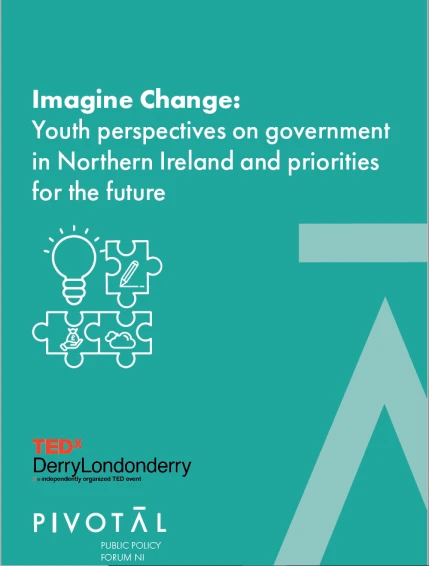
Spending Review – analysis and comment from Pivotal
The Spending Review gives Northern Ireland a three-year funding settlement but means difficult choices ahead for the Executive. The money will have to be spent wisely – and targeted at specific priorities with a strong emphasis on public service transformation, according to Ann Watt, Director of independent think tank Pivotal.
Chancellor Rachel Reeves today laid out the UK Government’s social and economic vision for the next three years – with big implications for Northern Ireland. Her plans to invest in the health service, education and housing will unlock some new funding for Stormont, but the Executive now faces tricky decisions on how to spend this new money.
The three-year Spending Review will see the Executive’s block grant rise from £18.4 billion in 2025-26 to £18.8 billion in 2026-27, £19.2 billion in 2027-28 and £19.8 billion in 2028-29, giving Northern Ireland the highest real terms funding allocation since devolution. This works out as an average annual real terms growth rate for NI of 0.4% for resource spending and 0.7%% for capital spending over this period.
These figures are the outcome from the Barnett formula, so they mirror the approach across the UK of boosting public spending on investment while also giving some new funding for day-to-day public services.
While funding increases in England were focused on the health service, the Northern Ireland Executive is free to spend all its funding as it chooses according to its own priorities.
The Spending Review settlement also includes agreement between the NI Executive and the UK Government about how NI’s relative need for public spending will be reflected in the Barnett formula, a subject that has been closely debated in recent months. Following a review by Professor Gerry Holtham, it has been agreed that relative need will be defined at 124% for Barnett calculations over this Spending Review period.
The Spending Review settlement is an opportunity for the Executive to draw a line under the repeated budgetary crises of recent years. However, the additions for Northern Ireland are relatively modest, particularly for day-to-day spending. They will require the Executive to make difficult decisions about spending.
The settlement also includes some specific allocations outside of the Barnett formula, including £50 million for Casement Park, continued funding for City and Growth Deals and for public service transformation, and a total of £137 million for the PSNI’s Additional Security Fund and the Executive programme for tackling paramilitarism and organised crime.
Ann Watt, Director of Pivotal, the independent think tank focused on Northern Ireland, said this money provides welcome extra funding and stability for Northern Ireland, but that the Executive has an obligation to use the money well.
Ann, who spent many years working in the Treasury including in the preparation of several Budgets, said: “The Spending Review marks an important point for Northern Ireland. There is some extra money for both day-to-day public services and capital investment, plus agreement to a new methodology for reflecting need in the Barnett formula. The announcements today provide three years of clarity on what public spending is going to look like.
“The Executive now needs to move away from single-year, crisis budgets and take more ownership of its own financial position. A multi-year settlement provides a chance for Ministers to plan for the next three years, and choose how best to prioritise spending, investment, reform and workforce planning.
“It is vital these three-year allocations are passed on to individual Departments and, from there, on to all the organisations funded by them, so they can also see the benefits of stable budgets.
“However, these are only modest increases in funding, so the Executive will have to prioritise and think strategically. It would be wise to pick a small number of priority areas and focus on improving them, rather than trying to do everything.
“This approach – including plans that are specific, detailed and costed, with a clear and accountable roadmap for delivery – would allow the Executive to move on from the constant crises and firefighting of recent years.
“When it comes to public services, transformation is essential. This is the only way that services can be made sustainable and affordable for now and the future. A focus on prevention and early intervention is key. There need to be changes in how and where services are delivered, increased use of tech, including an approach to AI that is positive but realistic. Reconfiguration of the health service should be the number one priority.
“The new injection of capital funding can be used to assist with the decades-long lack of investment in wastewater infrastructure, increase new starts in social housing, further modernise public transport and provide targeted support to parts of the schools estate. Again, choosing priorities will be important, rather than trying to do everything.
“Now might also be the time for the Executive to have a serious conversation about increased revenue raising to boost the funding it has available for public services, as suggested in yesterday’s report from the NI Fiscal Council about the sustainability of funding for water here.”
ENDS
Notes to Editors
Ann Watt is available for media interviews.
For further information or to schedule an interview, contact Ryan Miller on 07789 552 340 or ryan@millercomms.co.uk.
Pivotal is an independent think tank launched in September 2019. Pivotal aims to help improve public policy in Northern Ireland
Pivotal’s published reports are available here
Pivotal’s Board of Trustees provides oversight of its work. They are David Gavaghan (Chair); Sarah Creighton; Judith Gillespie; Jarlath Kearney; Sinéad McSweeney; Rosalind Skillen; Andrew McCormick; Seamus McAleavey; Alan Whysall
Pivotal’s Director Ann Watt is a former senior civil servant with 25 years’ experience in public policy development and delivery. Most recently Ann was Head of the Electoral Commission in Northern Ireland (2014-2019)
Pivotal has received funding and in-kind support from Belfast Harbour Commissioners, The Community Foundation Northern Ireland, the Department of Foreign Affairs and Trade, The Joseph Rowntree Charitable Trust, NICVA, Queen’s University Belfast, Ulster University
For further information about Pivotal see pivotalppf.org or contact Pivotal’s Director Ann Watt on 07932 043835
Follow Pivotal on X/Twitter @pivotalppf, LinkedIn @Pivotal-PPF and Blue Sky @pivotalppf.bsky.social










